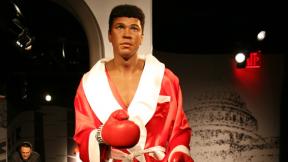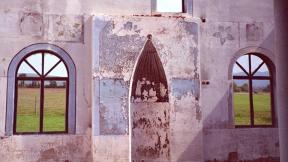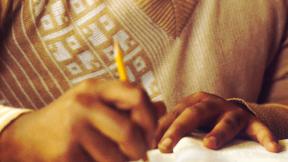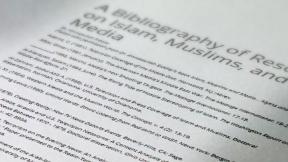
We've grown used to questionable portrayals of Muslims in cinema. We are all too familiar with the stereotypic characters.
There is the Terrorist of The Siege, True Lies and Executive Decision. There is the Masculine Oppressor of Not Without My Daughter and Father of the Bride II.
There is the overweight, barbaric sultan of The Adventures of Baron Munchausen and Aladdin. There is the extravagant hypocrite of My Beautiful Laundrette. And, there is the scheming villain of (the Mohammad Ali Jinnah character in) Gandhi.
But, there have been a number of sympathetic characters. We cannot forget the struggling freedom fighters of The Living Daylights, The Battle for Algiers and Three Kings. We must remember the heroes of The 13th Warrior and Robin Hood: Prince of Thieves. We must remember the spiritual leader of The Jewel in the Nile.
There have been the unnamed spiritual mentors of The Hurricane and South Central. And, there have been the true-to-life portrayals of Malcolm X, The Message, Jinnah and Lion of the Desert.
Despite the many positive portrayals, it is still agreed that the portrayals of Muslims in contemporary cinema is largely an unsatisfactory, negative one. Too often, when we learn of a Muslim character in a film, we hold our breath as we wait to find out if the portrayal is negative or positive. And, too often, we find out that we've been branded as villains.
Still, in the past year, there have been a few roles that stand out for their extremely sympathetic portrayal of Muslims. Of the films that were shown in the US during the year 2000, these are the best.
1. Mohammad (The Color of Paradise, directed by Majid Majidi)
If it is possible to make a truly Islamic film, then this film may be it. It is the tale of young Muhammad. He is a blind grade-schooler who is full of love, despite the fact that his heart aches because his father does not want him.
When I saw this film, the theater was only half-full, yet at many of the emotional moments, the crying of the audience members made the dialogue difficult to understand. Thematically, from the opening credits, this film is a search for Allah.
Muhammad, having been abandoned by his father, cries stating that when he meets Allah, he will open his heart and share with him all of his innermost secrets.
It is ironic that this film is produced in Iran, considering that the much applauded films produced by the government's Institute for the Intellectual Development for Children and Young Adults lack any mention of Islam, despite their constant preaching of morality. The Iranian government can learn a lot from this film.
2. Imam (Pitch Black, directed by David Twohy)
I know of no reason for the need of this character in this film. He did not need to be a Muslim. He could have just as easily followed another religious belief. But, he is indeed a Muslim and is portrayed as a devout Muslim. And, thankfully, it is an extremely positive portrayal.
Imam is a traveler on a spaceship that crash lands on a distant planet. He (along with three younger Muslims) works with the crew mates searching for the resources necessary to get them back on course. His driving force is his faith in Allah. His conviction is so strong that the movie's villain also has a change of heart.
This portrayal of Muslims is extremely unique. Not only is it extremely positive, but the Muslim characters play an important part in the plot of the story, and are also shown as being multicultural in their makeup.
3. Karim Nazir (Vertical Limit, directed by Martin Campbell)
Again, as is the case with Pitch Black we see the portrayal of a devout Muslim who is involved with the storyline of the film. Of all the films on the list, this movie is the most recent and the most traditional (in terms of Hollywood production quality).
Unlike Pitch Black, the Muslim in this film is in his own geographic element. Karim is a Pakistani Muslim climber in the Himalayas assisting a rescue mission. He takes a break during his climb to perform his Salah. He is extremely courteous and respectful with his crew mates. Let's hope that such a portrayal is a sign of good things to come in the future.
4. Farid (My Son the Fanatic, directed by Udayan Prasad)
Few Muslims will like this film as almost every character (Muslim and non-Muslim) is portrayed negatively. It is the story of the struggles of an Indo-Pakistani family in modern, racist London. At the center are two characters, a misbehaving, double-talking, self-contradicting father and his son Farid.
Farid is a young man ready to marry the daughter of the Chief of Police, but decides to reject her and the un-Islamic lifestyle he once lived. Instead, he joins hands with a spiritual leader and becomes a devout Muslim.
Eventually, his path crosses his father's, and they are forced to confront each other's practices. As the only sincere character in the film, Farid is portrayed as the model of Muslim youth in the West. Struggling for identity. Frustrated. Rejected. Dejected.
With such a strong, sympathetic character it is unfortunate that this film is unnecessarily crude.
Keep in mind that this list is not an endorsement of the content of any of these films. Despite the positive portrayals, some of these films contain Haram material and some contain material that may be difficult for children.
Looking back on the year, it is clear that there are some positive portrayals of Muslims. Of course, there are such films as Rules of Engagement and East is East that offer extremely negative and extremely offensive portrayals. Insha Allah, things will change toward the better (or, as shown with the list above, will continue to
improve).








Add new comment